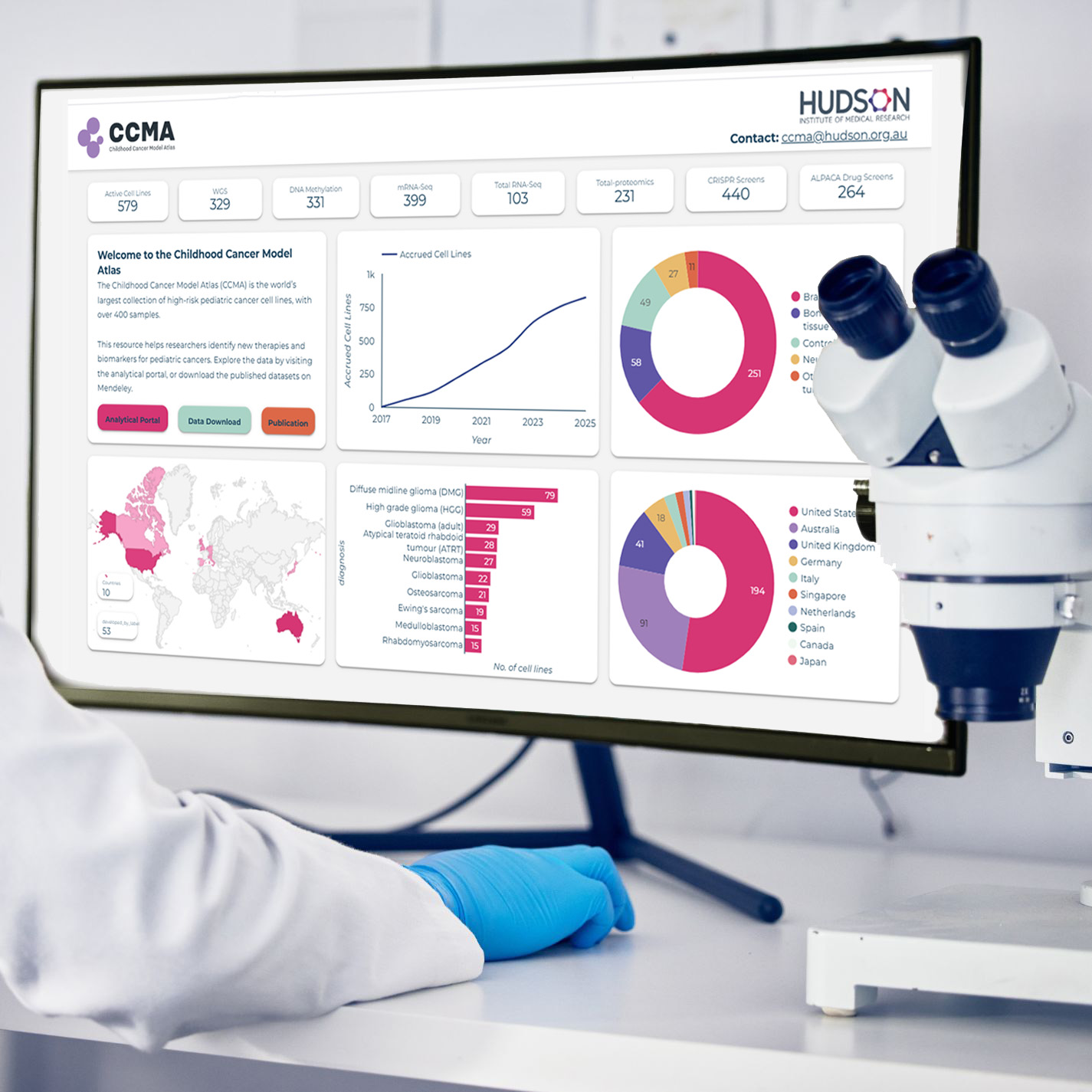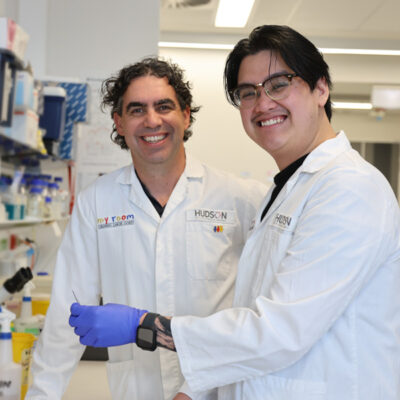Childhood cancer ‘organoid’ program set to revolutionise treatment
By Hudson Institute communications
The Hudson Monash Precision Medicine Program hopes to significantly improve treatment for childhood cancer patients with the greatest unmet clinical need – those diagnosed with brain cancers and solid tumours.
Launched today (February 7) ahead of International Childhood Cancer Day on February 15, the two year program is being established with a $1.3 million investment from the Children’s Cancer Foundation.
Scientists at Hudson Institute of Medical Research will establish a living biobank of paediatric brain tumours and solid cancers – including living organoids or lab-grown ‘mini-tumours’ – to trial and develop new targeted treatments and improve survival rates for childhood cancer patients.
Lead researcher and Head of Hudson Institute’s Centre for Cancer Research, Associate Professor Ron Firestein, said the research program is aimed at ensuring children with cancer benefit from major advances already being made in adult solid tumours.
According to A/Prof Firestein, “Every child’s tumour is genetically unique and responds to cancer treatment in a different way. Knowledge of the genetic variability of paediatric tumours is building at a fast pace and this program is aimed at translating this information into treatment.
“Current treatment options, such as chemotherapy and radiation, can have devastating long-term health effects for childhood cancer survivors. Our aim is to develop effective, targeted treatment options with fewer side effects for these young patients which may improve long-term survival.”
The living biobank will be established using tumour biopsies taken when children are surgically diagnosed at Monash Children’s Hospital, as well as at The Royal Children’s Hospital.
The program will maximise international collaborations, with paediatric cancer experts from across the world gathering in Clayton today (February 7) for Hudson Institute’s Childhood Cancer Research Symposium.
Scientists will grow the tissue samples into organoids (three-dimensional tumour cultures that mimic a tumour’s genetic profile). They will then run specialised genetic tests, called CRISPR screens, to identify key genetic mutations in tumours that can be targeted with specific drugs. New pharmaceutical compounds will be trialled using the organoids, effectively testing thousands of drugs and drug combinations on organoids to inform the most effective treatment for each patient.
Dr Peter Downie, Head of the Monash Children’s Hospital Cancer Centre said, “Our ultimate aim is to give every parent and newly diagnosed child with cancer the hope of a cure. Organoids will enable researchers to examine the responsiveness of a tumour to different drugs in real time. Feeding this vital information back to clinicians is the key.”

Hudson Institute of Medical Research and Monash Children’s Hospital are grateful to the Children’s Cancer Foundation for its foresight in supporting this program and for its commitment to advancing research into paediatric cancer.
“The Children’s Cancer Foundation is proud to fund this innovative program, which draws on Australian and international expertise and collaboration across hospitals and research institutes. We hope that one day all Australian children and adolescents with cancer will benefit from this research program,” said Aileen Boyd-Squires, Chief Executive of the Children’s Cancer Foundation.
“Over 25 years, the Foundation has distributed almost $40 million to hospitals and research institutes. We are committed to improving paediatric cancer services and bringing more world-class projects like the Hudson Monash Precision Medicine Program to Australia.”
What is precision cancer medicine?
Precision cancer medicine is an emerging approach to disease treatment and prevention that takes into account individual variability in genetic data and other unique personalised information.
Before precision cancer medicine, patients with a specific type and stage of cancer would receive a ‘one size fits all’ treatment. However, certain treatments can have debilitating side effects and may work better for some patients than for others. Some patients also require lower dosages of these toxic drugs than other patients.
Precision cancer medicine involves testing genetic material from patients’ tumours to identify the mutations or other changes that drive their cancer. Scientists and clinicians then use this information to identify therapies that are targeted to the individual patient and their specific sub-type of cancer.
Precision medicine has the potential to revolutionise healthcare delivery, by improving treatment effectiveness as well as sparing patients the costs and side-effects of therapies from which they would not benefit, based on their individual profile. This is particularly important for children with cancer, many of whom will live with the side effects of their treatment for the rest of their lives.
Contact us
Hudson Institute communications
t: + 61 3 8572 2697
e: communications@hudson.org.au
In this article
About Hudson Institute
Hudson Institute’ s research programs deliver in three areas of medical need – inflammation, cancer, women’s and newborn health. More
Hudson News
Get the inside view on discoveries and patient stories
“Thank you Hudson Institute researchers. Your work brings such hope to all women with ovarian cancer knowing that potentially women in the future won't have to go through what we have!”







